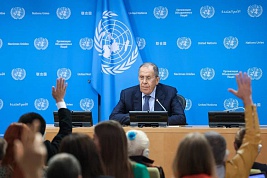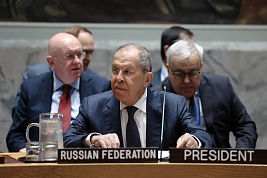Foreign Minister Sergey Lavrov’s statement at the Conference on Disarmament, Geneva, February 28, 2018
Madame President,
Secretary General of the Conference,
Thank you for the opportunity to address this authoritative forum once again.
The Conference on Disarmament (CD) plays a unique role in the field of arms control, disarmament and nonproliferation. It holds a special place in the sustainable international machinery established alongside the UNDC and the UNGA First Committee. Under the aegis of the CD the fundamental agreements upholding the belief in humanity’s capacity to avoid self-destruction were elaborated. Improving the forum’s efficiency is of a crucial significance in preventing fragmentation of global efforts to implement the disarmament agenda, search for reasonable compromises, create conditions for maintenance of peace, equal and indivisible security for all.
Under the current complex circumstances at the international arena systematic collective efforts to ensure security and stability at the global and regional levels have gained particular relevance.
One has to acknowledge that the work of our forum has been stalled in recent years. Therefore, we need to overcome the existing differences and agree upon a balanced Programme of Work of the Conference without any further delay. Solution to the most pertinent issues in the field of arms control and nonproliferation prompts us to resume the negotiating work at the earliest.
We believe that it is possible to redress the situation by drawing upon the richest legacy and long-standing traditions of negotiations which unite all the participants of the forum. The historical experience proves that even in the most difficult times we need to demonstrate will and responsibility, forgo narrow national interests and come up with consolidated responses to the large-scale challenges of our time.
Nuclear disarmament definitely remains at the core of the international agenda. Russia as a responsible and consistent advocate of this process has been making an outstanding contribution to further reductions of strategic offensive arms. On the 5th of February we confirmed that we had reached the aggregate limits of nuclear armaments and their means of delivery under the Treaty on Measures for the Further Reduction and Limitation of Strategic Offensive Arms. Therefore, the Russian nuclear arsenal has been reduced by more than 85 percent as compared to the Cold War peak.
At the same time, despite these impressive achievements in implementing the Russia-US agreement, it is noteworthy that we still have some pending questions to our colleagues in Washington. In particular, it relates to unilateral removal of a considerable amount of strategic arms from the accountability under the Treaty, as a matter of fact, by circumventing the procedures established by the Treaty. These procedures stipulate, inter alia that methods applied for removal of strategic arms from the accountability by the other State are crystal clear. We are also concerned by a considerable shift in the US approaches in the context of the updated Nuclear Posture Review which provides for a greater role of nuclear weapons. This includes the development and deployment of «low-yield» warheads thus leading to a lower threshold of the nuclear weapons use.
At any rate, guided by the spirit and the letter of the NPT we have reached the point when all the States that possess nuclear military potential should join in further efforts towards nuclear disarmament. Besides, one should not ignore a new reality: disarmament is impossible without due consideration of the whole range of developments and factors that affect strategic stability and international security. Among those there currently are the unrestricted deployment of the global missile defense system, development of high precision non-nuclear strategic offensive arms, non-ratification of the Comprehensive Nuclear-Test-Ban Treaty, a possibility of deployment of offensive weapons in outer space.
Nuclear disarmament is hampered by the US non-strategic nuclear weapons in Europe as well as the destabilizing practice of so called NATO nuclear sharing. Within its framework non-nuclear NATO Member-States participate in planning of employment of the US non-strategic nuclear weapons and get involved into appropriate skills training in grave violation of the NPT. Everyone should understand that by doing so the US military train the armed forces of the European countries to employ tactical nuclear weapons against Russian Federation.
I would like to remind you once again that Russia has neither deployed tactical nuclear weapons, nor any practice of employing those. All existing armaments were transferred to central storage facilities on the national territory. Under these circumstances the presence of ready-for-use US tactical nuclear weapons in Europe is not just a rudiment of the Cold War, but clearly an aggressive stance. I hope that European citizens will be in a position to say a resolute “no” to stationing on their territory of the most powerful weapon of mass destruction possessed by the one and only State which used it against population of Hiroshima and Nagasaki.
Without taking into account all the factors that impact strategic stability, the principles of equal security it is impossible to advance along the way leading to elimination of nuclear weapons what sponsors of the Treaty on their prohibition call for. This initiative, as we have pointed out on many occasions, not only fails to facilitate progress towards this noble goal, but rather causes problems with securing viability and effectiveness of the NPT review cycle. And this year the NPT marks the 50th anniversary of its opening for signature.
To preserve the regime of this key instrument it is also crucial to achieve tangible progress in bringing the CTBT that was elaborated here at the CD into force. This instrument is a basis that could help to overcome differences between Nuclear-Weapon States and Non-Nuclear-Weapon States. Moreover, it is essential to achieve a real progress in convening international conference on establishment of a zone free of nuclear and other WMDs in the Middle East.
Let me touch upon chemical disarmament. Russia has fully eliminated all its stockpiles of chemicals weapons. Meanwhile, we face a paradox when the United States, a major CWC State Party, which once insisted on adoption of a global legal obligation to eliminate chemical weapons until 2007, is still in a possession of the largest stockpile of this type of WMD and the prospects for its elimination remain elusive. In parallel, Washington while referring to fake news makers such as fully discredited “White Helmets” puts forward absurd claims against the Government of Syria. The latter in response to the joint initiative by Moscow and Washington eliminated its chemical weapons stockpiles under the strictest international control under extraordinary circumstances of war against international terrorism and continues to cooperate with the OPCW Technical Secretariat.
It is deplorable that the US and its allies cynically exploit baseless allegations of toxic chemicals’ use by Damascus as a tool of anti-Syrian geopolitical engineering.
Just an hour ago an informal meeting to promote another anti-Syrian «offspring» so called «International Partnership against Impunity for the Use of Chemical Weapons», established on January 23 in Paris, was arranged by France nearby. We reaffirm that such closed-door and non-inclusive initiatives are totally unacceptable. Those are invented to substitute discussions at the OPCW and the UN for a comfortable company of like-minded ones in absence of alternative opinions.
We should not forget about the threat of biological weapons which by their deadly impact can outmatch all known methods of killing human beings. The work to create a verification mechanism for the Biological Weapons Convention remains blocked due to the US position. I hope that our US partners are aware of their responsibility for breaking the deadlock.
For the time being Washington opts to freeze the status-quo. At the same time the US by imposing bilateral arrangements outside the BWC framework on different countries attempts to set up a biosecurity infrastructure controlled by itself that would be easy to manipulate.
During the Russian Presidency at the CD last year, we succeeded, with the assistance of responsibly thinking States, in fixing the issue of elaboration of an International Convention for the Suppression of Acts of Chemical and Biological Terrorism (ICCBT) on the CD agenda. It is necessary to continue its substantive discussion during this session as well. I hope it will be done. The preparation of this extremely relevant instrument, which meets the interests of all States, will allow relaunching the CD activities in full compliance with its mandate.
Another priority of ours is the prevention of an arms race in outer space. Russia is not the only country which is concerned about the prospects of “weaponization” of outer space – and it is proved by the fact that our initiatives aimed at addressing the threat enjoy broad support. I would like to remind that it was here at the CD, 10 years ago, that we together with our Chinese friends put forward a draft Treaty on the Prevention of the Placement of Weapons in Outer Space, the Threat or Use of Force against Outer Space Objects. Its updated version was submitted to the Conference on Disarmament in 2014.
I think that without elaborating and adopting a legally binding international arrangement that would contain reliable guarantees that weapons will never emerge in outer space, it is getting practically impossible to address the issues of ensuring international security and strategic stability. We are willing to discuss any concerns of interested parties. We regard the UN Group of Governmental Experts on the prevention of an arms race in outer space, to be launched this year, as an appropriate mechanism to jointly search for solutions and as an additional measure that would give a needed impetus to the process at the CD.
The Russian Federation is ready to resume the CD negotiation activities on any Program of Work that is balanced and consensus-based. No item on the CD agenda is taboo for Russia. We have both political will and the expertise to start full-fledged negotiations at the CD. We, as well as the UN General Secretary, who spoke here two days ago, highly appreciate the decision taken by the Conference on February 16 to establish five subsidiary bodies to search for the outcome with the aim of launching negotiations on the agenda items.
Madame President,
Ladies and gentlemen,
I wish to conclude by saying that Russia calls upon all States to demonstrate political will and maximum responsibility to resume substantive work at the Conference. The way to the really effective agreements in the field of arms control always goes only through full-fledged negotiations and search for consensus-based solutions.
I wish all participants fruitful work and every success in coping with issues that so far impede activities of this most important international forum.
Thank you for your attention.


